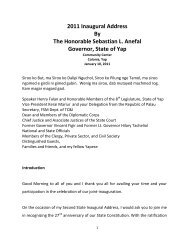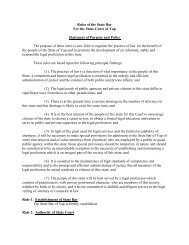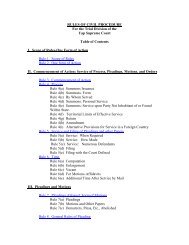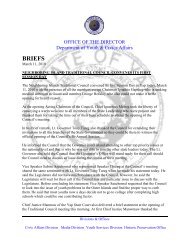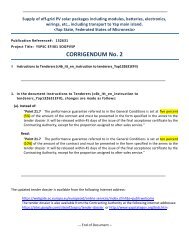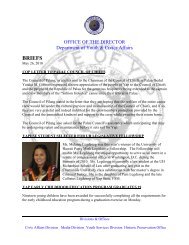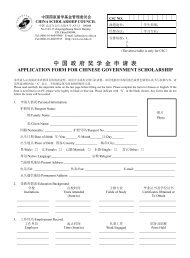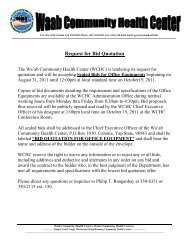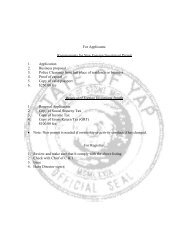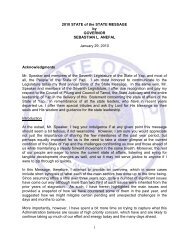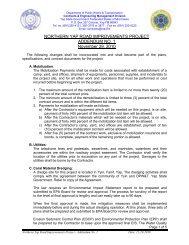Yap Summit Community Sector - Yap State Government
Yap Summit Community Sector - Yap State Government
Yap Summit Community Sector - Yap State Government
You also want an ePaper? Increase the reach of your titles
YUMPU automatically turns print PDFs into web optimized ePapers that Google loves.
YAP STATE GOVERNMENT<br />
Computer Emergency Response Team (PacCERT), Pacific ICT Regulatory Resource Center (PIRRC), and ICT Capacity<br />
Building for Pacific ACP Countries (ICB4PAC).]<br />
The <strong>Sector</strong> through existing reviews and/or policies<br />
U.S. Department of Interior: Report to Congress on the First 5years Review of the Compact of free Association<br />
with the Federated <strong>State</strong>s of Micronesia (2010)<br />
pp. 15. “The value of private sector production, excluding households, … it averaged 26.8 percent in 1995-2008.”<br />
pp. 16. “According to the IMF, the FSM was ranked 126 th in the world in the most recent Doing Business Report<br />
from the World Bank. This ranking, the IMF notes, was not only lower than the previous one, but also the lowest<br />
among the Pacific Island countries.”<br />
pp. 18. “This unavoidable reduction in Compact grant and public spending translates to jobs and income, which<br />
have so far not been replaced by gains in private sector outputs and jobs.”<br />
pp. 18. BUSINESS AND TAXES: “the call for growth in business and, therefore, the tax base more urgent.”<br />
pp. 18. PUBLIC INFRASTRUCTURE: “one way to increase economic output quickly is to expand public infrastructure<br />
that would add to the productive capacity of the economy in the longer term and create jobs in the near term.”<br />
pp. 18. INFRASTRUCTURE – TOURISM: “ Infrastructure such as improvements in roads and port and airport<br />
facilities may particularly be helpful to tourism, which despite slow growth in recent years holds some potential …<br />
specialty groups such as divers, the so called eco-tourists and regional and world explorers of the oceans.”<br />
FSM: Comments from the Federated <strong>State</strong>s of Micronesia on the Five Year Review of the Amended Compact of<br />
Free Association (2011)<br />
pp. 47. “private sector output has declined by 1.9% across the FSM from FY04 to FY08 … <strong>Yap</strong> a significant decrease.<br />
This lackluster performance is attributable to a number of factors including delays in the implementation of<br />
infrastructure projects, the erosion of household spending power, the continued weakness of exports, the<br />
worldwide economic slowdown, the slumping of the nation’s tourism industry, the impacts of the global financial<br />
markets crisis, the slowing of remittances from overseas workers and the shift in productive factors based on<br />
consumption-induced price shifts.”<br />
pp. 47. TAX REFORM: “The major components of the proposed reform include:<br />
• Modernization and strengthening of Tax Administration through a unified Revenue Authority Act (URA);<br />
• Elimination of the Gross Receipts Tax (GRT) and the Wage and Salary Tax and replacement by a 25%Net<br />
Profits Tax (NPT);<br />
• Introduction of a 10% value-added tax (VAT) to replace current national customs duties and state sales<br />
taxes, as well as state ability to impose an exercise tax. “<br />
pp. 48. “Institutional structures are the investment, employment, fiscal, monetary and external policies that<br />
contribute to the nature of the private sector climate. The World Bank identifies each of these policy areas as<br />
contributing to the “Ease of Doing Business” (EDB) index in a particular country. The FSM debuted on the World<br />
Bank’s EDB index in 2009 as the 125 Th most business friendly country of the 183 countries tracked … Overall the<br />
21 | P a g e



